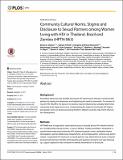| dc.contributor.author | Ojikutu, Bisola O. | en_US |
| dc.contributor.author | Pathak, Subash | en_US |
| dc.contributor.author | Srithanaviboonchai, Kriengkrai | en_US |
| dc.contributor.author | Limbada, Mohammed | en_US |
| dc.contributor.author | Friedman, Ruth | en_US |
| dc.contributor.author | Li, Shuying | en_US |
| dc.contributor.author | Mimiaga, Matthew J. | en_US |
| dc.contributor.author | Mayer, Kenneth H. | en_US |
| dc.contributor.author | Safren, Steven A. | en_US |
| dc.date.accessioned | 2016-06-14T18:53:47Z | |
| dc.date.issued | 2016 | en_US |
| dc.identifier.citation | Ojikutu, Bisola O., Subash Pathak, Kriengkrai Srithanaviboonchai, Mohammed Limbada, Ruth Friedman, Shuying Li, Matthew J. Mimiaga, Kenneth H. Mayer, and Steven A. Safren. 2016. “Community Cultural Norms, Stigma and Disclosure to Sexual Partners among Women Living with HIV in Thailand, Brazil and Zambia (HPTN 063).” PLoS ONE 11 (5): e0153600. doi:10.1371/journal.pone.0153600. http://dx.doi.org/10.1371/journal.pone.0153600. | en |
| dc.identifier.issn | 1932-6203 | en |
| dc.identifier.uri | http://nrs.harvard.edu/urn-3:HUL.InstRepos:27320447 | |
| dc.description.abstract | Background: Serostatus disclosure may facilitate decreased HIV transmission between serodiscordant partners by raising risk awareness and heightening the need for prevention. For women living with HIV (WLWH), the decision to disclose may be influenced by culturally determined, community-level stigma and norms. Understanding the impact of community HIV stigma and gender norms on disclosure among WLWH in different countries may inform intervention development. Methods: HPTN063 was a longitudinal, observational study of sexually active HIV-infected individuals, including heterosexual women, in care in Zambia, Thailand and Brazil. At baseline, a questionnaire measuring community HIV stigma and gender norms, anticipated stigma, demographic, partner/relationship characteristics, and intimate partner violence was administered. Longitudinal HIV disclosure to sexual partners was determined via audio-computer assisted self-interview (ACASI) at the baseline and quarterly during the one year following up. Logistic regression was conducted to identify the predictors of disclosure. Results: Almost half (45%) of women living with HIV acknowledged perceived community HIV stigma (the belief that in their community HIV infection among women is associated with sex work and multiple sexual partners). Many women (42.9%) also acknowledged perceived community gender norms (the belief that traditional gender norms such as submissiveness to husbands/male sexual partners is necessary and that social status is lost if one does not procreate). HIV disclosure to current sex partners was reported by 67% of women. In multivariate analysis, among all women, those who were older [OR 0.16, 95%CI(0.06,0.48)], reported symptoms of severe depression [OR 0.53, 95%CI(0.31, 0.90)], endorsed anticipated stigma [OR 0.30, 95%CI(0.18, 0.50)], and were unmarried [OR 0.43, 95%CI(0.26,0.71)] were less likely to disclose to current partners. In an analysis stratified by marital status and cohabitation, unmarried [OR 0.41, 95%CI(0.20,0.82)] and non-cohabiting women [OR 0.31, 95%CI(0.13,0.73)] who perceived community HIV stigma were less likely to disclose to their sex partners. Conclusions: Perceived community level HIV stigma, along with individual level factors such as anticipated stigma, depressive symptoms, and older age, predict non-disclosure of HIV status to sexual partners among WLWH in diverse geographic settings. Interventions to promote disclosure among women in serodiscordant relationships should incorporate community-level interventions to reduce stigma and promote gender equality. | en |
| dc.language.iso | en_US | en |
| dc.publisher | Public Library of Science | en |
| dc.relation.isversionof | doi:10.1371/journal.pone.0153600 | en |
| dc.relation.hasversion | http://www.ncbi.nlm.nih.gov/pmc/articles/PMC4859553/pdf/ | en |
| dash.license | LAA | en_US |
| dc.subject | Biology and Life Sciences | en |
| dc.subject | Microbiology | en |
| dc.subject | Medical Microbiology | en |
| dc.subject | Microbial Pathogens | en |
| dc.subject | Viral Pathogens | en |
| dc.subject | Immunodeficiency Viruses | en |
| dc.subject | HIV | en |
| dc.subject | Medicine and Health Sciences | en |
| dc.subject | Pathology and Laboratory Medicine | en |
| dc.subject | Pathogens | en |
| dc.subject | Organisms | en |
| dc.subject | Viruses | en |
| dc.subject | Biology and life sciences | en |
| dc.subject | RNA viruses | en |
| dc.subject | Retroviruses | en |
| dc.subject | Lentivirus | en |
| dc.subject | Medicine and health sciences | en |
| dc.subject | Diagnostic medicine | en |
| dc.subject | HIV clinical manifestations | en |
| dc.subject | Public and occupational health | en |
| dc.subject | Preventive medicine | en |
| dc.subject | HIV prevention | en |
| dc.subject | Social Sciences | en |
| dc.subject | Sociology | en |
| dc.subject | Criminology | en |
| dc.subject | Crime | en |
| dc.subject | Violent Crime | en |
| dc.subject | Intimate Partner Violence | en |
| dc.subject | Epidemiology | en |
| dc.subject | HIV epidemiology | en |
| dc.subject | People and Places | en |
| dc.subject | Population Groupings | en |
| dc.subject | Ethnicities | en |
| dc.subject | Thai People | en |
| dc.subject | Mental Health and Psychiatry | en |
| dc.subject | Mood Disorders | en |
| dc.subject | Depression | en |
| dc.subject | Geographical Locations | en |
| dc.subject | Africa | en |
| dc.subject | Zambia | en |
| dc.title | Community Cultural Norms, Stigma and Disclosure to Sexual Partners among Women Living with HIV in Thailand, Brazil and Zambia (HPTN 063) | en |
| dc.type | Journal Article | en_US |
| dc.description.version | Version of Record | en |
| dc.relation.journal | PLoS ONE | en |
| dash.depositing.author | Ojikutu, Bisola O. | en_US |
| dc.date.available | 2016-06-14T18:53:47Z | |
| dc.identifier.doi | 10.1371/journal.pone.0153600 | * |
| dash.contributor.affiliated | Ojikutu, Bisola | |
| dash.contributor.affiliated | Mayer, Kenneth | |
| dc.identifier.orcid | 0000-0001-7460-733X | |


